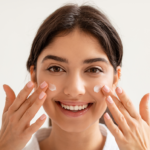Your baby’s skin is much thinner, more delicate and less resistant to bacteria than your own. Inside the womb, the skin doesn’t need protection against bacteria and toxins: your baby’s skin is already protected. It’s only after your baby is born that their skin adapts itself to the elements of the world beyond the womb. As a result, baby skin is more susceptible to allergens, irritation, dehydration, toxins and harmful bacteria. In addition, the hard water we have in our taps here the UAE can have an alkaline pH, and this has been linked to higher rates of eczema in babies, compared to soft water.
Our expert advice on how to best moisturise your babies skin is as follows:
- Choose products specially developed for babies.
- Moisturise your baby after every bath, shower or swim session, making sure to rinse off any residue of chlorine from pool water (if applicable).
- Ensure that particularly dry areas are moisturised at least once a day.
- Use just the amount that the skin can absorb. Don’t overdo it!
- Always do a patch test 24 hours before using any new products.
- Go for products and remedies that are as natural as possible. Many products for adults contain chemicals that may irritate your baby’s skin while baby products (and this applies to both soaps, shampoos and lotions) are made with delicate, sensitive skin in mind.
- Look for products containing the herbal ingredient chamomile. It soothes irritated skin and particularly so in the usual areas of contact chaffing such as elbows and knees. Well suited for the prevention of nappy rash dermatitis, the active ingredient panthenol, on the other hand, is necessary for stimulating the skins healing processes.
Feel free to contact us if you have any questions about the skincare products we carry at Mumzworld. We are always happy to help and guide wherever we can.






